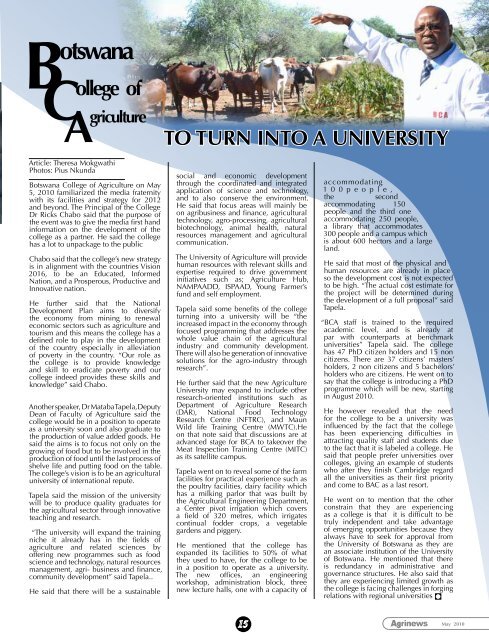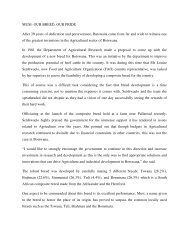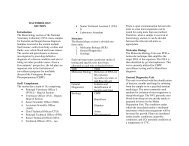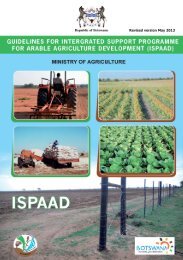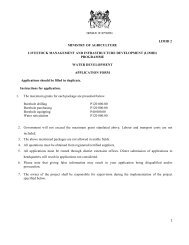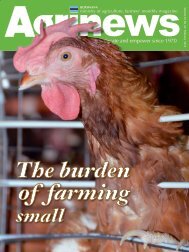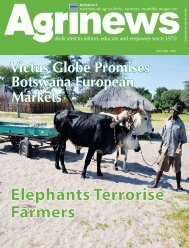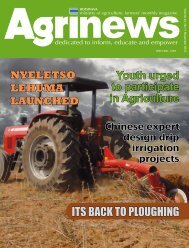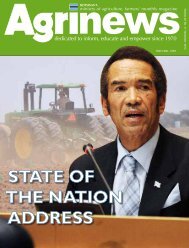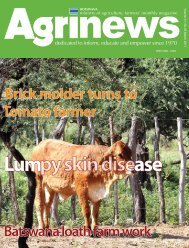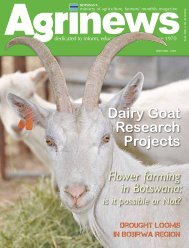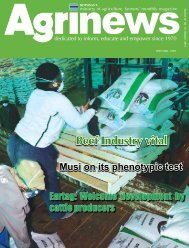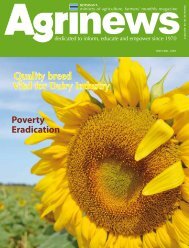Botswana's karakul renaissance - Ministry of Agriculture
Botswana's karakul renaissance - Ministry of Agriculture
Botswana's karakul renaissance - Ministry of Agriculture
Create successful ePaper yourself
Turn your PDF publications into a flip-book with our unique Google optimized e-Paper software.
B otswana<br />
College <strong>of</strong><br />
A griculture<br />
TO TURN INTO A UNIVERSITY<br />
Article: Theresa Mokgwathi<br />
Photos: Pius Nkunda<br />
Botswana College <strong>of</strong> <strong>Agriculture</strong> on May<br />
5, 2010 familiarized the media fraternity<br />
with its facilities and strategy for 2012<br />
and beyond. The Principal <strong>of</strong> the College<br />
Dr Ricks Chabo said that the purpose <strong>of</strong><br />
the event was to give the media first hand<br />
information on the development <strong>of</strong> the<br />
college as a partner. He said the college<br />
has a lot to unpackage to the public<br />
Chabo said that the college’s new strategy<br />
is in alignment with the countries Vision<br />
2016, to be an Educated, Informed<br />
Nation, and a Prosperous, Productive and<br />
Innovative nation.<br />
He further said that the National<br />
Development Plan aims to diversify<br />
the economy from mining to renewal<br />
economic sectors such as agriculture and<br />
tourism and this means the college has a<br />
defined role to play in the development<br />
<strong>of</strong> the country especially in alleviation<br />
<strong>of</strong> poverty in the country. “Our role as<br />
the college is to provide knowledge<br />
and skill to eradicate poverty and our<br />
college indeed provides these skills and<br />
knowledge” said Chabo.<br />
Another speaker, Dr Mataba Tapela,Deputy<br />
Dean <strong>of</strong> Faculty <strong>of</strong> <strong>Agriculture</strong> said the<br />
college would be in a position to operate<br />
as a university soon and also graduate to<br />
the production <strong>of</strong> value added goods. He<br />
said the aims is to focus not only on the<br />
growing <strong>of</strong> food but to be involved in the<br />
production <strong>of</strong> food until the last process <strong>of</strong><br />
shelve life and putting food on the table.<br />
The college’s vision is to be an agricultural<br />
university <strong>of</strong> international repute.<br />
Tapela said the mission <strong>of</strong> the university<br />
will be to produce quality graduates for<br />
the agricultural sector through innovative<br />
teaching and research.<br />
“The university will expand the training<br />
niche it already has in the fields <strong>of</strong><br />
agriculture and related sciences by<br />
<strong>of</strong>fering new programmes such as food<br />
science and technology, natural resources<br />
management, agri- business and finance,<br />
community development” said Tapela..<br />
He said that there will be a sustainable<br />
social and economic development<br />
through the coordinated and integrated<br />
application <strong>of</strong> science and technology,<br />
and to also conserve the environment.<br />
He said that focus areas will mainly be<br />
on agribusiness and finance, agricultural<br />
technology, agro-processing, agricultural<br />
biotechnology, animal health, natural<br />
resources management and agricultural<br />
communication.<br />
The University <strong>of</strong> <strong>Agriculture</strong> will provide<br />
human resources with relevant skills and<br />
expertise required to drive government<br />
initiatives such as; <strong>Agriculture</strong> Hub,<br />
NAMPAADD, ISPAAD, Young Farmer’s<br />
fund and self employment.<br />
Tapela said some benefits <strong>of</strong> the college<br />
turning into a university will be “the<br />
increased impact in the economy through<br />
focused programming that addresses the<br />
whole value chain <strong>of</strong> the agricultural<br />
industry and community development.<br />
There will also be generation <strong>of</strong> innovative<br />
solutions for the agro-industry through<br />
research”.<br />
He further said that the new <strong>Agriculture</strong><br />
University may expand to include other<br />
research-oriented institutions such as<br />
Department <strong>of</strong> <strong>Agriculture</strong> Research<br />
(DAR), National Food Technology<br />
Research Centre (NFTRC), and Maun<br />
Wild life Training Centre (MWTC).He<br />
on that note said that discussions are at<br />
advanced stage for BCA to takeover the<br />
Meat Inspection Training Centre (MITC)<br />
as its satellite campus.<br />
Tapela went on to reveal some <strong>of</strong> the farm<br />
facilities for practical experience such as<br />
the poultry facilities, dairy facility which<br />
has a milking parlor that was built by<br />
the Agricultural Engineering Department,<br />
a Center pivot irrigation which covers<br />
a field <strong>of</strong> 320 metres, which irrigates<br />
continual fodder crops, a vegetable<br />
gardens and piggery.<br />
He mentioned that the college has<br />
expanded its facilities to 50% <strong>of</strong> what<br />
they used to have, for the college to be<br />
in a position to operate as a university.<br />
The new <strong>of</strong>fices, an engineering<br />
workshop, administration block, three<br />
new lecture halls, one with a capacity <strong>of</strong><br />
accommodating<br />
1 0 0 p e o p l e ,<br />
the<br />
second<br />
accommodating 150<br />
people and the third one<br />
accommodating 250 people,<br />
a library that accommodates<br />
300 people and a campus which<br />
is about 600 hectors and a large<br />
land.<br />
He said that most <strong>of</strong> the physical and<br />
human resources are already in place<br />
so the development cost is not expected<br />
to be high. “The actual cost estimate for<br />
the project will be determined during<br />
the development <strong>of</strong> a full proposal” said<br />
Tapela.<br />
“BCA staff is trained to the required<br />
academic level, and is already at<br />
par with counterparts at benchmark<br />
universities” Tapela said. The college<br />
has 47 PhD citizen holders and 15 non<br />
citizens. There are 37 citizens’ masters’<br />
holders, 2 non citizens and 5 bachelors’<br />
holders who are citizens. He went on to<br />
say that the college is introducing a PhD<br />
programme which will be new, starting<br />
in August 2010.<br />
He however revealed that the need<br />
for the college to be a university was<br />
influenced by the fact that the college<br />
has been experiencing difficulties in<br />
attracting quality staff and students due<br />
to the fact that it is labeled a college. He<br />
said that people prefer universities over<br />
colleges, giving an example <strong>of</strong> students<br />
who after they finish Cambridge regard<br />
all the universities as their first priority<br />
and come to BAC as a last resort.<br />
He went on to mention that the other<br />
constrain that they are experiencing<br />
as a college is that it is difficult to be<br />
truly independent and take advantage<br />
<strong>of</strong> emerging opportunities because they<br />
always have to seek for approval from<br />
the University <strong>of</strong> Botswana as they are<br />
an associate institution <strong>of</strong> the University<br />
<strong>of</strong> Botswana. He mentioned that there<br />
is redundancy in administrative and<br />
governance structures. He also said that<br />
they are experiencing limited growth as<br />
the college is facing challenges in forging<br />
relations with regional universities<br />
May 2010


